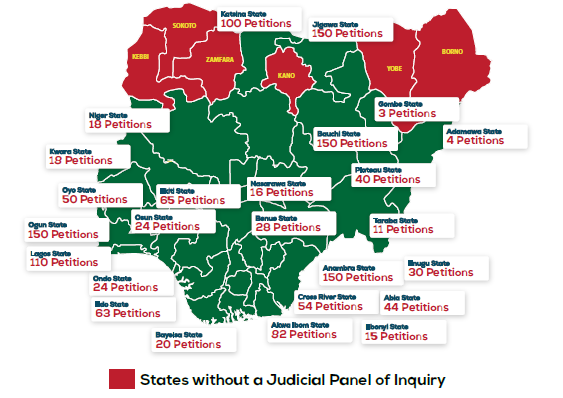26th – 30th October 2020
On October 14, 2020 The National Economic Council (NEC) led by the Vice President of the Federal Republic of Nigeria, Prof. Yemi Osinbajo directed the immediate establishment of State-based Judicial Panels of Inquiry across the country to receive and investigate complaints of Police brutality or related extrajudicial killings. The panels are expected to ensure justice for victims of the dissolved Special Anti-Robbery Squad (SARS) and other police units. The Judicial Panels which would be set up in all the States would include representatives of Youths, Students, Civil Society Organizations, retired police officers of high repute, representative of the State Attorney General, a representative from the National Human Rights Commission and would be chaired by a respected retired State High Court Judge.
As of 30th October 2020, – 28 states across the country have set up the Judicial Panels of Inquiry and the Lagos State Judicial Panel of Inquiry began sitting on Monday, 26th October 2020. Data from 25 states shows a total of 37 youth representation (16.3%) and 51 women representation (22.5%) out of 227 members of the Judicial Panel of Inquiry.
Yiaga Africa and Enough is Enough (EIE) Nigeria note and recommend the following measures be adopted by the Panels in each of the states:
- Provide Disaggregated Data: there is a lack of information on members of the panels especially with respect to the age of the youth representatives, number of women, qualification. Panels are encouraged to release the profiles of all members of the panel and ages of youth and student representatives to ensure youth are represented by youth.
- Deploy Technology to Promote Participation: We note with concern the lack of public-facing channels for engagement with the panels. We call on the panels to embrace the use of technology via social media or traditional media channels to allow members of the public to follow live sittings of the panels. This will promote transparency and build confidence in the process.
- Adopt a People-Friendly Mode of Submission of Petition: We note that the format required to submit petitions and memoranda to the Panels is laborious, time-consuming and likely to discourage participation. Panels are advised to accept electronic submissions where applicable in order to reduce the burden of submission on the petitioners.
Effective and Periodic Communication on the Panel: to ensure accountability, the panel is advised to ensure periodic communication providing updates on the sittings of the panel. In addition, the panel is advised to guarantee access to independent observers to monitor the proceedings.
Signed
Cynthia Mbamalu
Yiaga Africa
‘Yemi Adamolekun
Enough is Enough (EiE)

